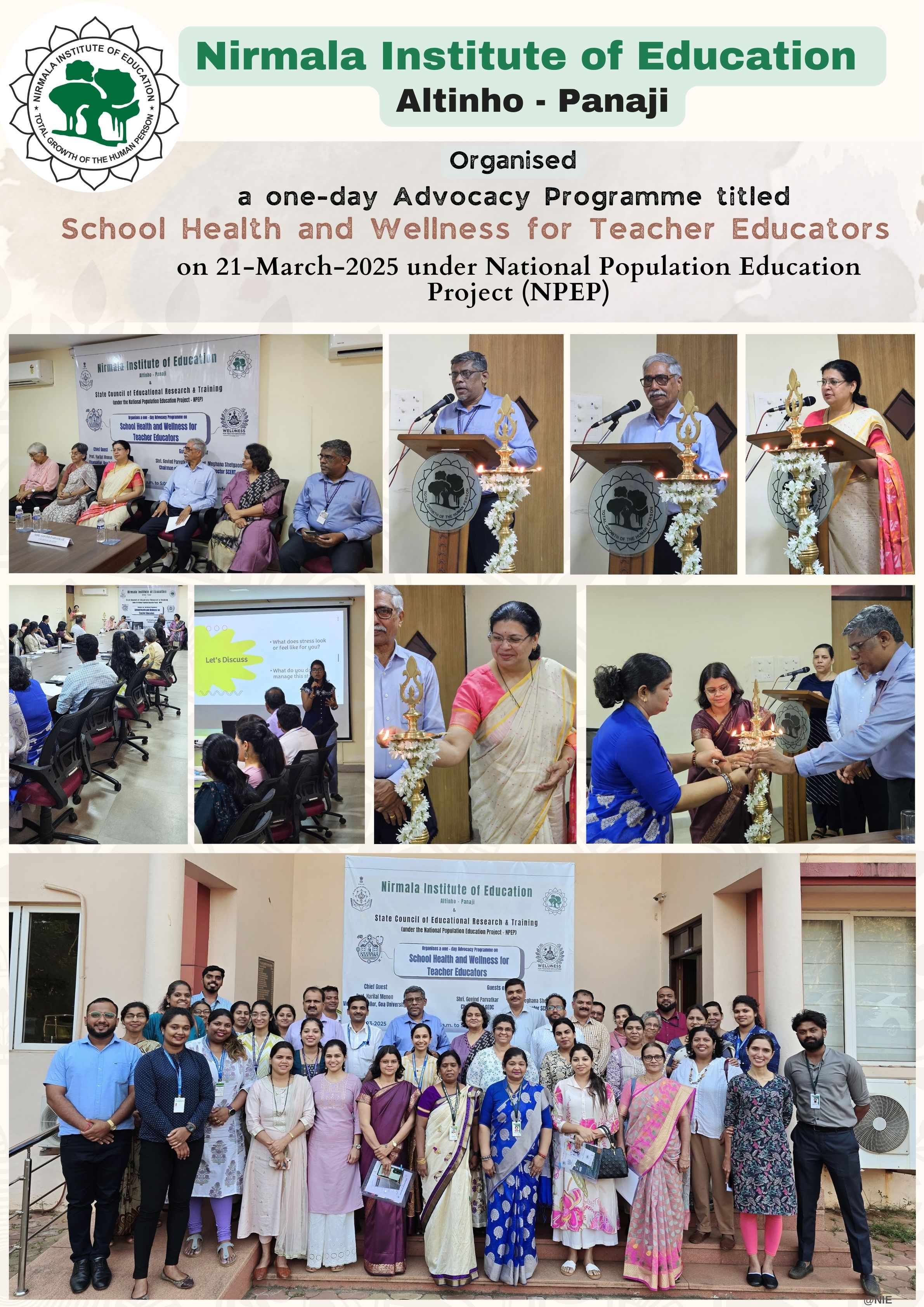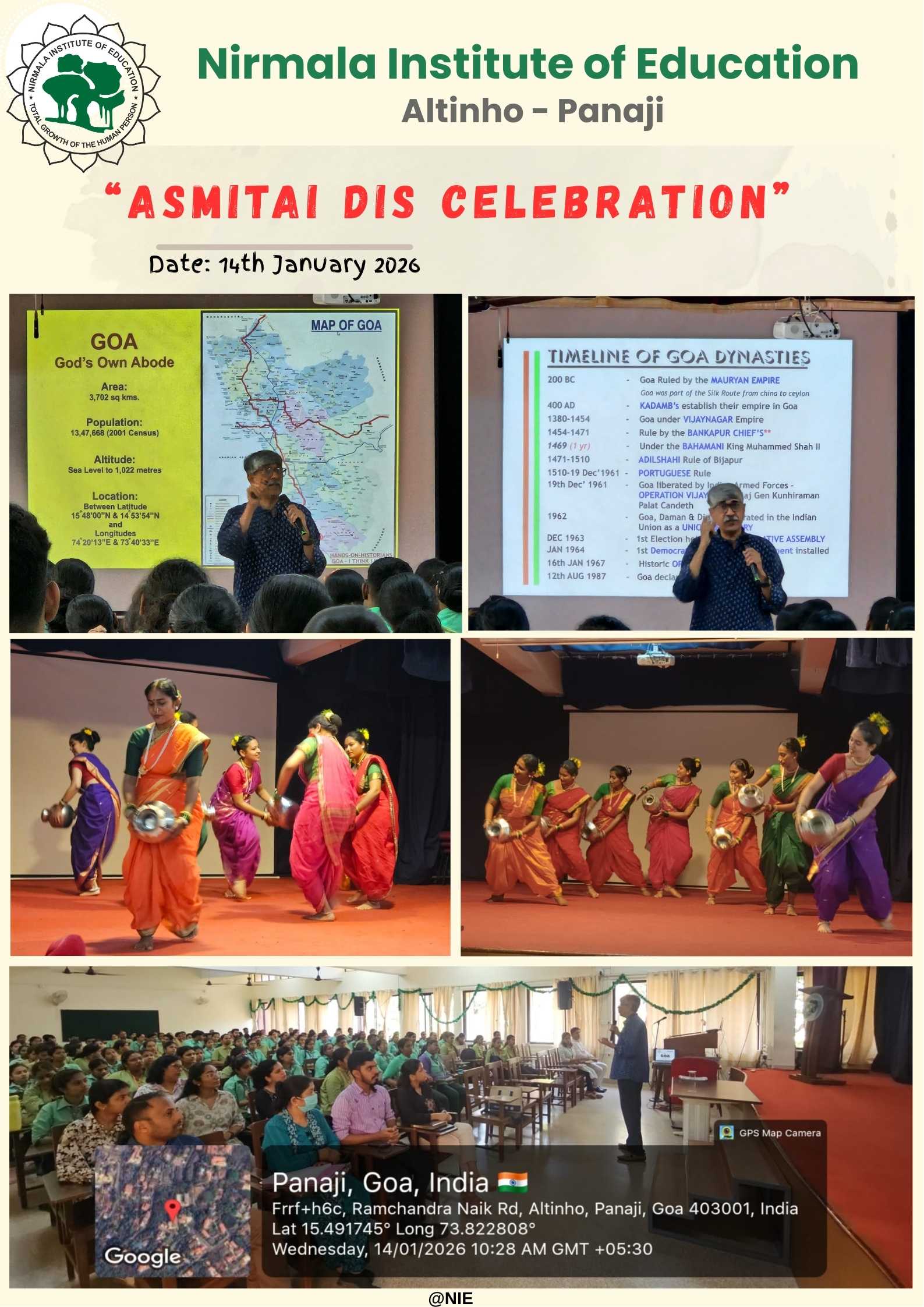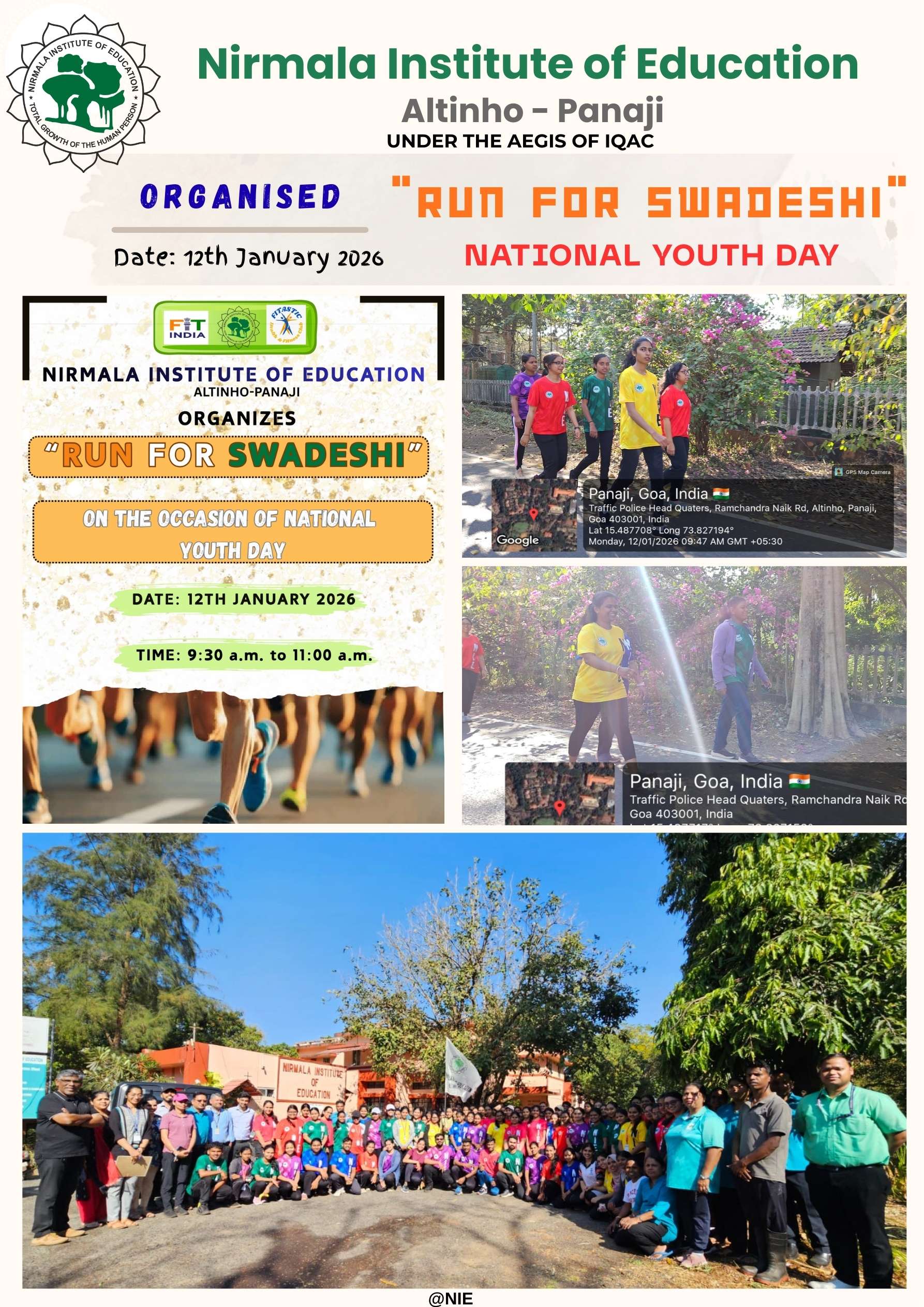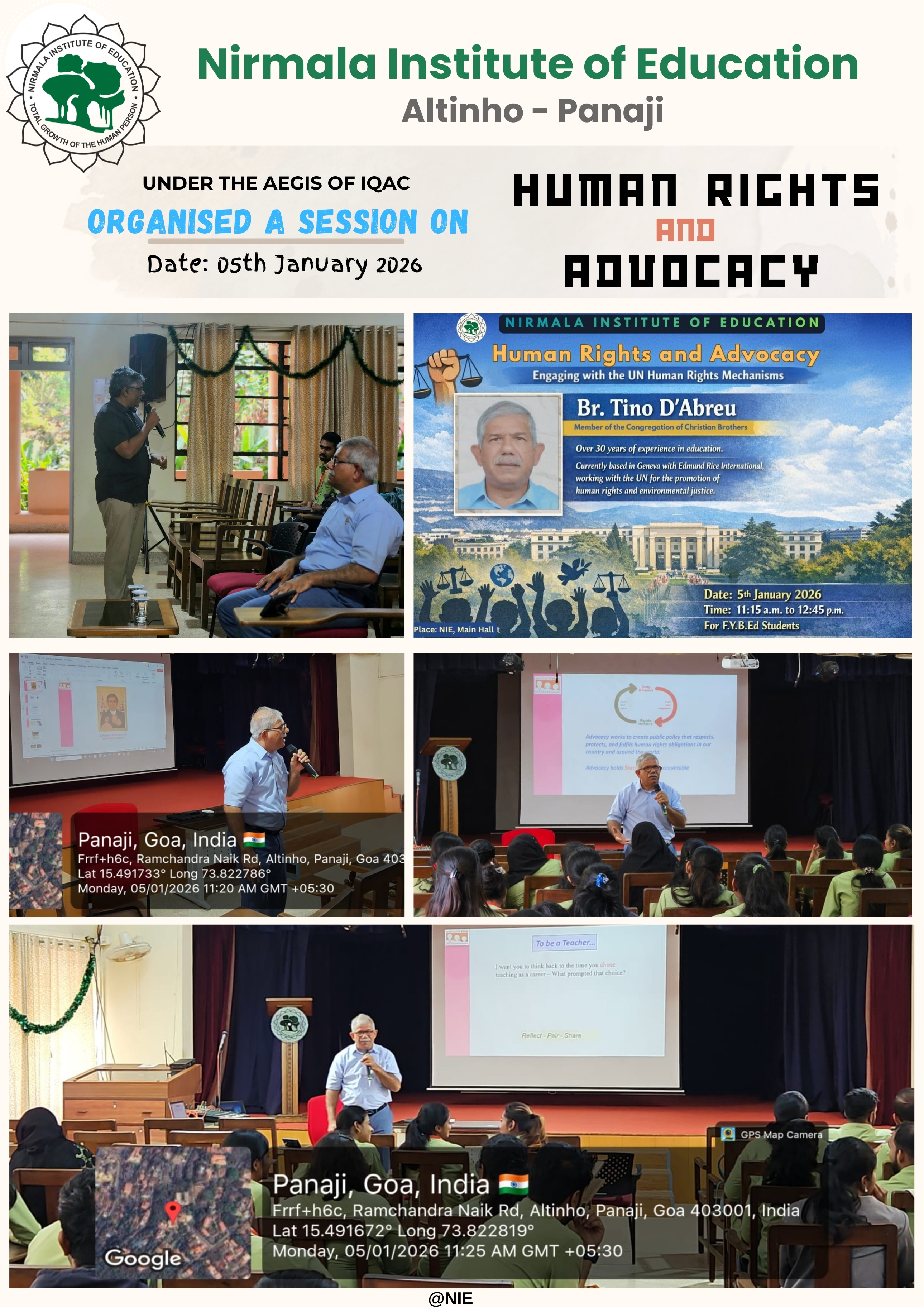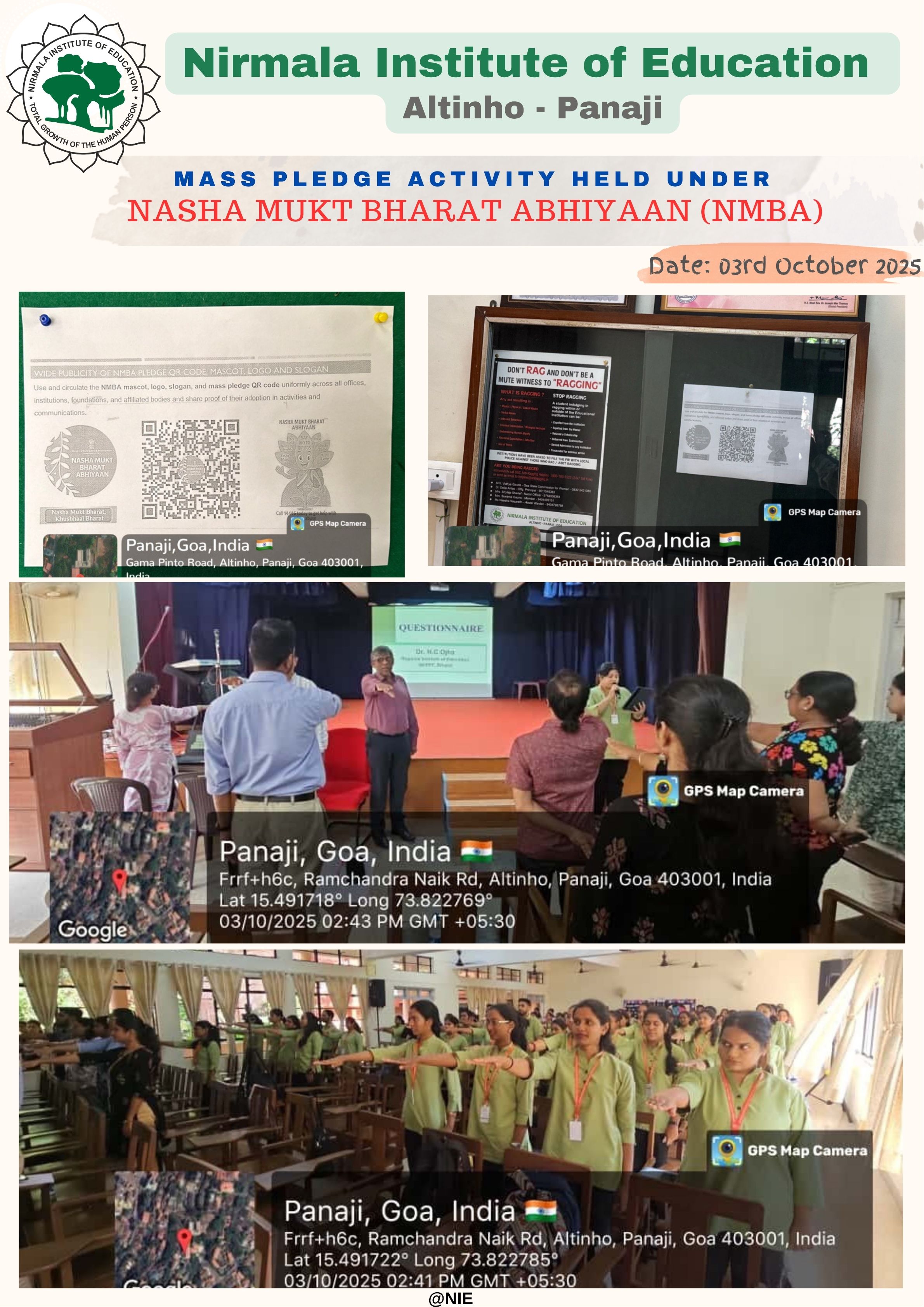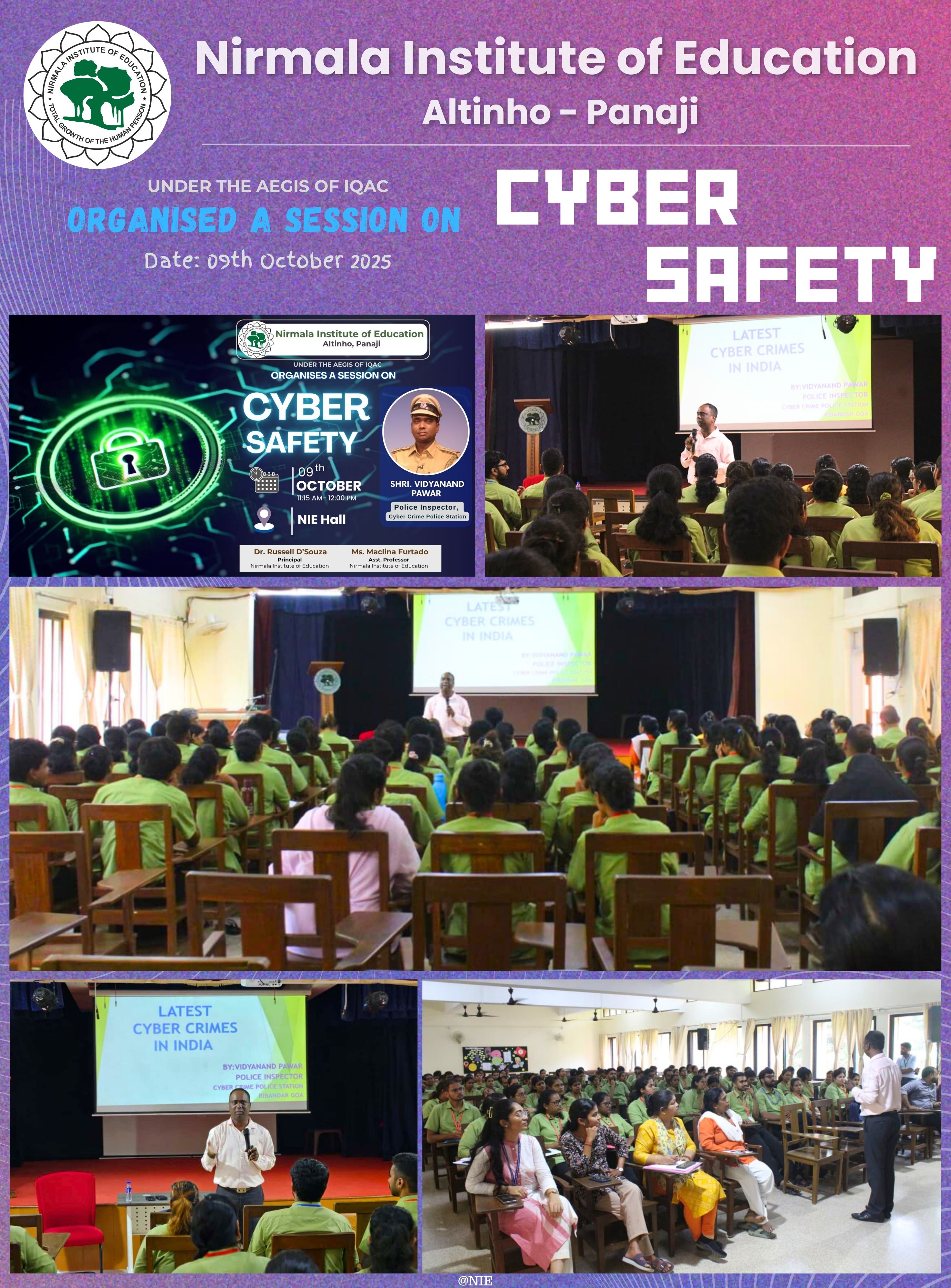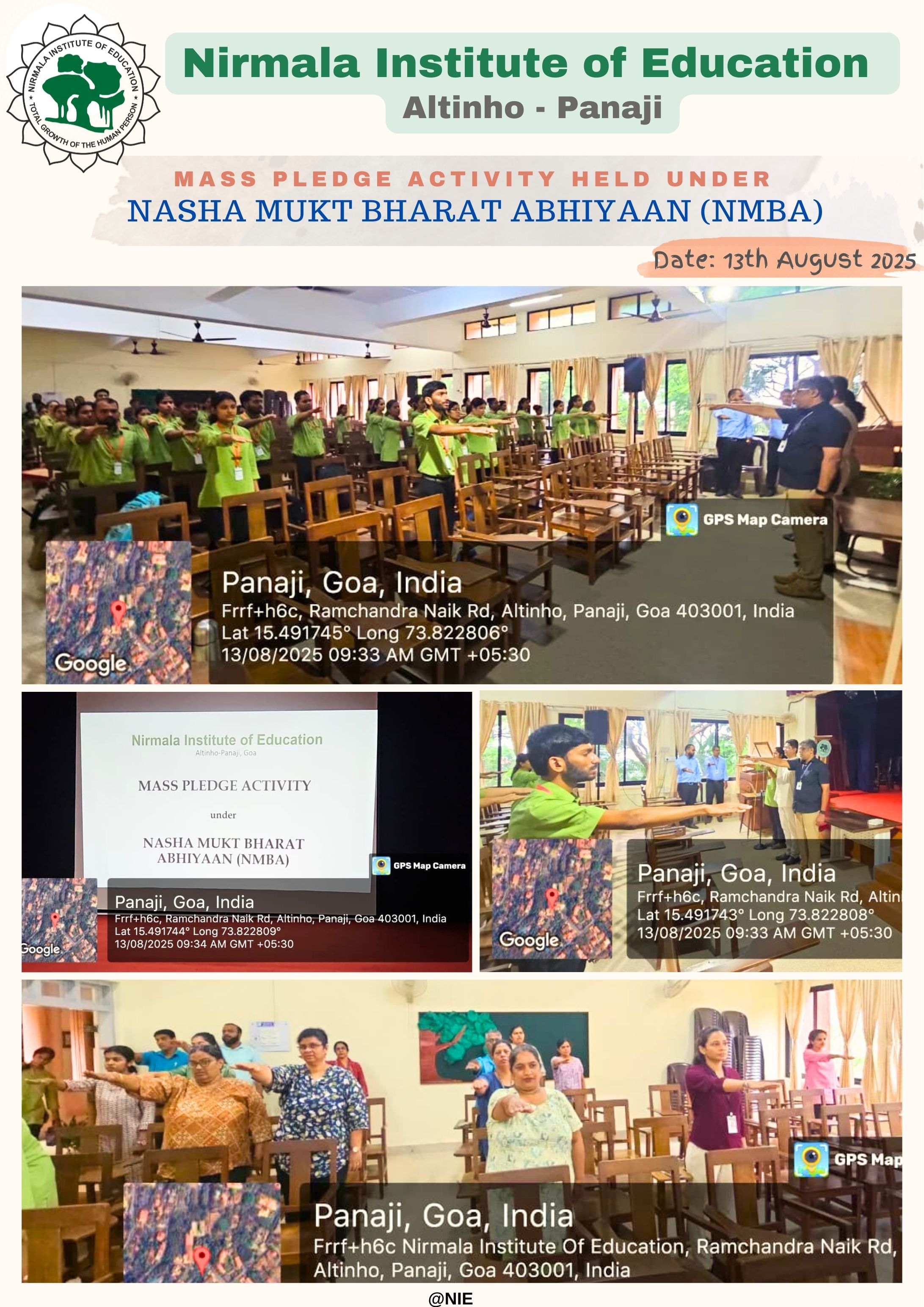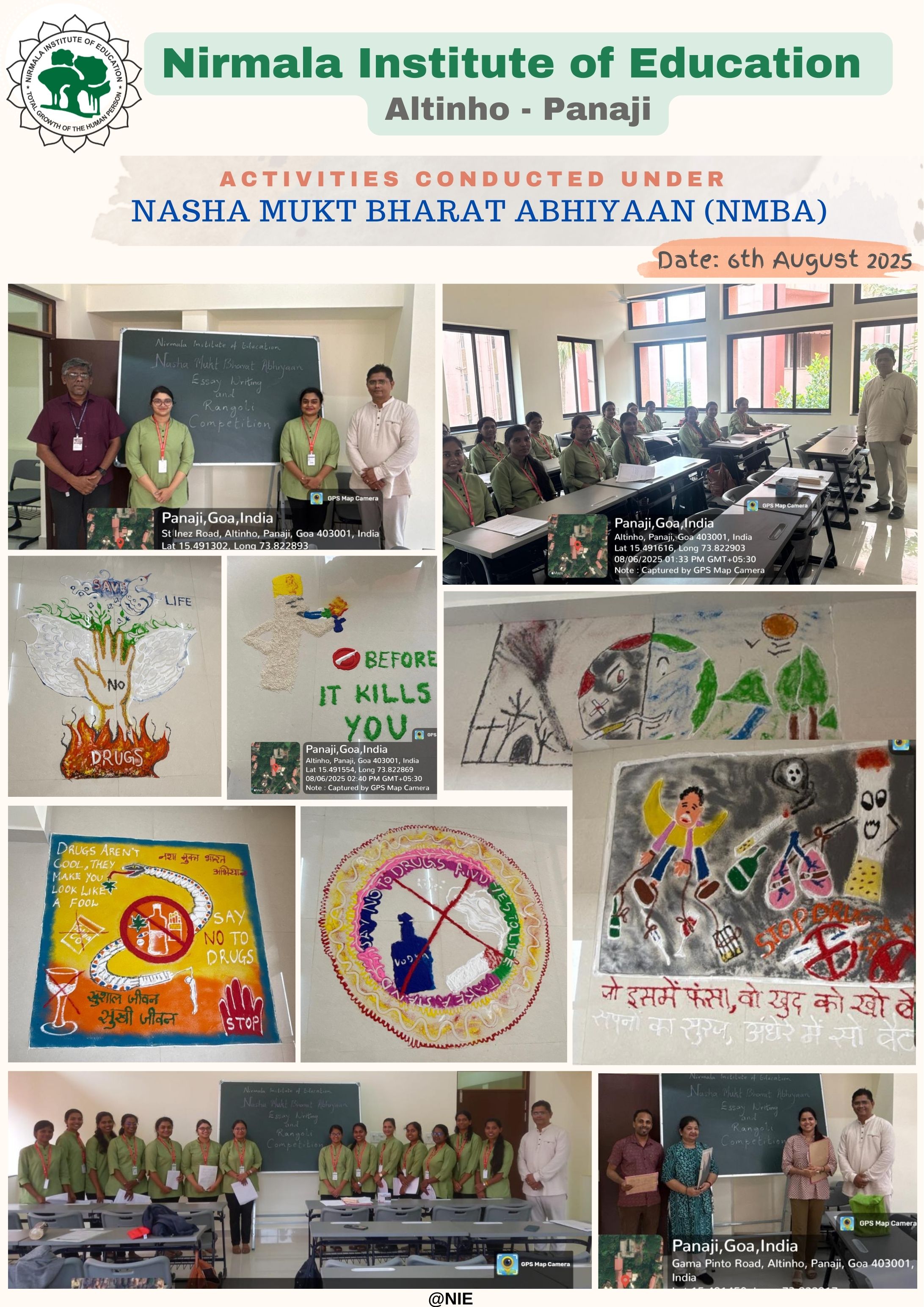Goy Asmitai Dis, commemorating the historic 1967 Opinion Poll in Goa, was celebrated at Nirmala Institute of Education on 14 January 2026. As part of the celebration, Dr. Russell D’Souza, Principal of Nirmala Institute of Education, addressed the gathering, followed by an insightful session by the renowned speaker and historian, Mr. Sanjeev V. Sardesai.
NIE organised a one - day Advocacy Programme on 'School Health and Wellness for Teacher Educators'
The Nirmala Institute of Education, in collaboration with the State Council of Educational Research and Training (SCERT), organized a One Day Advocacy Programme focusing on School Health and Wellness for Teacher Educators on March 21, 2025. The event aimed to integrate wellness into teaching practices, bringing together educators and stakeholders to discuss health, well-being, and student welfare.
The programme commenced with the Lighting of the Lamp ceremony at 9:30 a.m., symbolizing the dispelling of ignorance and the ushering in of knowledge. Dignitaries on the dais, including participants and resource persons, participated in this ritual. Following this, Dr. Russell D’Souza, the Principal of Nirmala Institute of Education, delivered the Welcome Address, emphasizing the significance of holistic development in education.
Notably, the scheduled Inaugural Address by Prof. Harilal Menon, Hon. Vice-Chancellor of Goa University, was cancelled due to his unforeseen absence. In his stead, Smt. Meghana Shetgaonkar, the Director of SCERT, addressed the gathering. She highlighted the critical role of teacher educators in fostering not only academic but also emotional and physical well-being among students. Following her address, Shri. Govind B. Parvatkar, the Chairman of the Goa Education Development Corporation (GEDC), spoke, emphasizing the importance of integrating wellness programmes into educational institutions to ensure long-term impact.
The morning session concluded with a Vote of Thanks by Ms. Olga Vaz, the Vice-President of Nirmala Education Society, who expressed gratitude to all dignitaries, resource persons, participants, and organizers. The session was compered by Ms. Millie Pereira, Assistant Professor, ensuring smooth transitions and engagement throughout the proceedings.
The technical sessions that followed were thoughtfully curated to cover various dimensions of health and wellness in the educational context. Ms. Talasha Sawant led a session on ‘Understanding the Self: The Foundation for Well-being,’ delving into self-awareness as the cornerstone of well-being. Ms. Farheen Shah discussed ‘Well-being in the Classroom and Beyond: Practical Strategies for Positive Living,’ emphasizing actionable strategies for promoting well-being within and outside classroom settings. Post-lunch, Ms. Linda Santos presented a pertinent session on ‘Awareness of Behavioural Red Flags in Classrooms,’ highlighting the significance of early identification of behavioural issues among students. The final session by Ms. Sulaxa Gawas, titled ‘Online and On Track: Helping Students Navigate Tech and Well-being,’ addressed the challenges of digital engagement and the importance of balancing screen time for students' digital wellness.
The day concluded with a Valedictory Session and Distribution of Certificates, recognizing the participation and contributions of attendees and resource persons. This marked a meaningful conclusion to an enriching day focused on equipping teacher educators with tools to promote wellness in their educational settings. The Valedictory Function was meticulously hosted by Assistant Professor. Ninosckha Pinto
The programme served as a significant step toward fostering a deeper understanding of the role of health and wellness in education. Through diverse sessions, the participants gained knowledge, strategies, and motivation to implement wellness-oriented practices in their institutions. The collaborative efforts of Nirmala Institute of Education and SCERT reflected their shared commitment to nurturing not only academically proficient but also emotionally and physically healthy educator and learners.
The Nirmala Institute of Education, in collaboration with the State Council of Educational Research and Training (SCERT), successfully organized a One Day Advocacy Program on School Health and Wellness for Teacher Educators on the 21st of March 2025. The program aimed to highlight the integral role of health and wellness in the educational ecosystem and equip teacher educators with strategies to foster holistic development among learners.
The day commenced with the ceremonial lighting of the lamp at 9:30 a.m., symbolizing the illumination of knowledge and well-being. The dignitaries present, along with a participant and resource person, came together to inaugurate the program with this auspicious gesture. Following this, Dr. Russell D’Souza, Principal of Nirmala Institute of Education, delivered the welcome address, wherein he underscored the growing need to prioritize mental, emotional, and physical well-being within educational settings. He emphasized that the responsibility of nurturing well-rounded individuals lies largely with educators, who must be equipped not only with pedagogical tools but also with the capacity to support students’ wellness.
The Inaugural Address, originally scheduled to be delivered by Prof. Harilal Menon, Hon’ble Vice-Chancellor of Goa University, was gracefully undertaken by Smt. Meghana Shetgaonkar, Director of SCERT, in his absence. Smt. Shetgaonkar highlighted the significance of fostering a culture of well-being in schools, advocating for teacher educators to take proactive steps in integrating wellness initiatives in their curriculum. She emphasized that the emotional, mental, and social dimensions of students’ growth are as vital as their academic progress, and it is imperative for educators to recognize and address these needs.
Adding further depth to the proceedings, Shri Govind B. Parvatkar, Chairman of the Goa Education Development Corporation, addressed the gathering. In his insightful speech, Shri Parvatkar reiterated the importance of government and institutional collaboration in promoting health and wellness initiatives. He stressed that sustainable progress in education requires consistent efforts to ensure that both educators and students operate in environments that support their overall well-being.
The inaugural session concluded with the Vote of Thanks proposed by Ms. Olga Vaz, Vice-President of Nirmala Education Society. She expressed her heartfelt gratitude to all dignitaries, resource persons, and participants for their valuable contributions to making the program a success. The session was seamlessly compered by Ms. Millie Pereira, Assistant Professor, who ensured the smooth flow of events with professionalism and grace.
Following the inaugural, the day transitioned into a series of enriching technical sessions designed to provide practical insights and strategies to the participants. The first session, led by Ms. Talasha Sawant, focused on “Understanding the Self: The Foundation for Well-being.” Through an engaging discussion, she encouraged educators to develop self-awareness and self-care practices, emphasizing how their own well-being sets the tone for the classroom environment.
This was followed by a session conducted by Ms. Farheen Shah on “Well-being in the Classroom and Beyond: Practical Strategies for Positive Living.” Ms. Shah provided educators with actionable techniques to create supportive classroom atmospheres, foster positive student-teacher relationships, and incorporate well-being practices into daily teaching routines.
After a brief lunch break, the afternoon session resumed with Ms. Linda Santos presenting on “Awareness of Behavioural Red Flags in Classrooms.” She focused on the early identification of behavioral concerns among students, outlining strategies for timely interventions and collaboration with mental health professionals when necessary.
The final technical session, led by Ms. Sulaxa Gawas, addressed the pertinent topic of digital wellness through her session titled “Online and On Track: Helping Students Navigate Tech and Well-being.” Recognizing the increasing reliance on digital tools in education, she discussed the challenges and opportunities that technology presents, offering guidance on managing screen time, promoting cyber safety, and supporting students’ mental health in the digital age.
The program concluded with a brief Valedictory Session and the distribution of certificates, acknowledging the active participation of all attendees and the valuable contributions of the resource persons. The day’s proceedings left participants with renewed awareness and practical approaches to integrating health and wellness within their educational institutions.
This advocacy program stood as a testament to the commitment of both Nirmala Institute of Education and SCERT towards nurturing not only academically competent students but also emotionally resilient and physically healthy individuals. It underscored the collective responsibility of educators, administrators, and policymakers in shaping a future where student well-being is at the heart of education.
